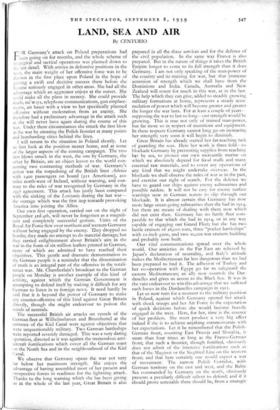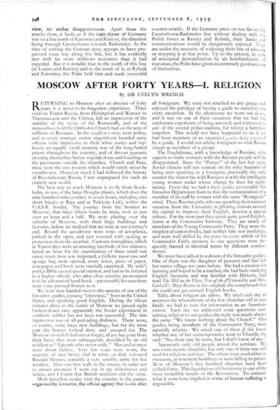LAND, SEA AND AIR
By CENTURIO r )R Germany's attack on Poland preparations had heen going on for months, and the whole scheme of ,ttategical and tactical operations was planned down to the last detail. With armies in defensive positions in the west, the main weight of her offensive force was to be thrown in the first place upon Poland in the hope of ,:aining a swift and decisive success there before she hecame seriously engaged in other areas. She had all the Advantage which an aggressor enjoys at the outset. She could make all the plans in secrecy. She could provide roads, rai:wlys, telephone communications, gun emplace ments, air bases with a view to her specifically planned (Ensive without molestation from an enemy. She therefore had a preliminary advantage in the attack such as she will never have again during the course of this war. Under these circumstances she struck the first blow in the war by crossing the Polish frontier at many points and bombarding cities behind the lines.
I will return to the situation in Poland shortly. Let us first look at the position nearer home, and at some of the larger aspects of the coming campaign. The two first blows struck in the west, the one by Germany, the other by Britain, are an object lesson to the world concerning two contrasting methods of war. Germany's action was the torpedoing of the British liner Athenia with 1400 passengers on board (311 Americans), zoo miles north-west of Ireland, without warning, and contrary to the rules of war recognised by Germany in the 1937 agreement. This attack has justly been compared with the sinking of the Desitania during the last war— the outrage which was the first itep towards provoking America into joining the Allies.
Our own first operation, carried out on the night of September 3rd-4th, will never be forgotten as a magnificent and completely successful gesture. Units of the Royal Air Force flew over northern and western Germany without being engaged by the enemy. They dropped no bombs; they made no attempt to do material damage; but they carried enlightenment about Britain's aim in the war in the form of six million leaflets printed in German, many of which are admitted to have reached their objectives. This gentle and dramatic demonstration to the German people is a reminder that the dissemination of truth is an integral part of the offensive in the totalitarian war. Mr. Chamberlain's broadcast to the German people on Monday is another example of this kind of activity, against which the German Government is attempting to defend itself by making it difficult for any German to listen in to foreign news. It need hardly be said that it is beyond the power of Germany to make any counter-offensive of this kind against Great Britain directly, though she might endeavour to poison the minds of neutrals.
The successful British air attacks on vessels of the German fleet at Wilhelmshaven and Brunsbuttel at the entrance of the Kiel Canal were against objectives that were unquestionably military. Two German battleships were reported severely damaged. This was a very daring operation, directed as it was against the tremendous antiaircraft fortifications which cover all the German coast on the North Sea and in the neighbourhood of the Kiel Canal.
We observe that Germany opens the war not very far below her maximum strength. She enjoys the advantage of having assembled most of her present and prospective forces in readiness for the lightning attack. Thanks to the long warning which she has been giving us in the whole of the last year, Great Britain is also prepared in all the three services and for the defence of the civil population. In the same way France is also prepared. But in the nature of things it takes the British Empire longer to come to its full strength than it does Germany. I am not only speaking of the man-power of the country and its training for war, but that immense accession of strength which we shall have from the Dominions and India. Canada, Australia and New Zealand will count for much in this war, as in the last.
The help which they can give, added to steadily growing military formations at home, represents a steady accu mulation of power which will become greater and greater the longer the war lasts. For at least a couple of years— supposing the war to last so long—our strength would be growing. This is true not only of trained man-power, but far more so in respect of munitions and equipment. In these respects Germany cannot long go on increasing her strength; very soon it will begin to diminish.
Great Britain has already started her far-reaching task of guarding the seas. Here her work is three fold—to blockade Germany by preventing supplies from reaching her by sea, to protect our own mercantile marine on which we absolutely depend for food stuffs and many essential raw materials, and to cover any operations of any kind that we might undertake overseas. In the blockade we shall observe the rules of war as in the past, and exercise our right of search. For the defence we have to guard our ships against enemy submarines and possible raiders. It will not be easy for enemy surface warships now in German waters to slip through our blockade. It is almost certain that Germany has now more large ocean-going submarines than she had in 1914, but there are means of dealing with them now which did not exist then. Germany has no battle fleet comparable to that which she had in 1914, or in any way capable of engaging our Grand Fleet; but she has two battle cruisers of 26,000 tons, three "pocket battleships" with i r-inch guns, and two to,000 ton cruisers building and probably now built.
Our vital communications spread over the whole world. Our anxieties in the Far East arc relieved by Japan's declaration of neutrality, and Italy's attitude makes the Mediterranean far less dangerous than we had been prepared to find it. The adhesion of Turkey and her co-operation with Egypt go far to safeguard the eastern Mediterranean; an ally now controls the Dardanelles and gives us access to the Black Sea. It was in the vain endeavour to win this advantage that we suffered such losses in the Dardanelles campaign in 1915.
Let us now turn for a moment to the military position in Poland, against which Germany opened her attack with shock troops and her Air Force in the expectation of quick decisions before she would become heavily engaged in the west. Here, for her, time is the essence of her problem. She must produce a very big effect indeed if she is to achieve anything commensurate with her expectations. Let it be remembered that the Polish German front, counting East Prussia and Slovakia, is more than four times as long as the Franco-German front; that such a frontier, though fortified, obviously does not admit of the intensive fortifications such as that of the Maginot or the Siegfried Line on the western front; and that here certainly one would expect a war of movement. The narrow Polish Corridor, with German territory on the east and west, and the Baltic Sea commanded by Germany on the north, obviously presents a peculiarly difficult salient to defend; and if it should prove untenable there should be, from a strategic view, no undue disappointment. Apart from the attacks there, it looks as if the main thrust of Germany was on a line north of Katowice and Krakov, the direction being through Czestochowa towards Radomsko. At the time of writing the German army appears to have progressed some way along this line, but it has evidently met with far more stubborn resistance than it had expected. But it is notable that to the north of this line (at Leszno and Rawicz) and to the south of it, at Rybnik and Katowice, the Poles held firm and made successful counter-attacks. If the Germans press on too far on the Czestochowa-Radomsko line without dealing with the Polish forces at Rawicz and Rybnik, their flanks and communications would be dangerously exposed. They are under the necessity of widening their line of advance or stopping it at that point. Up to the present, in spite of attempted demoralization by air bombardments of rear areas, the Poles have given an extremely good account of themselves.























 Previous page
Previous page